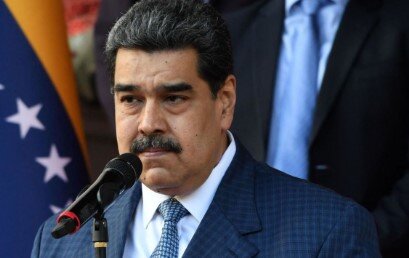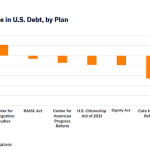
Daniel Raisbeck
Venezuela’s 75-year-old president-elect, Edmundo González, fled to Spain on September 8, soon after the Chavista regime issued an arrest warrant against him. González’s exile is the product of the regime’s reign of terror, unleashed since autocrat Nicolás Maduro lost the July 28 election by a 67-to-30-percent margin. Six Latin American countries recognize González’s legitimacy, while the United States acknowledges his electoral victory.
After the election, González initially took refuge in the Dutch embassy in Caracas and then went to the Spanish embassy, where he was coerced into accepting his removal from Venezuela. Under threat, González signed a letter, drafted by the regime’s officials, in which he accepted the Venezuelan Supreme Court’s decision to proclaim Maduro as the election’s winner. González’s subsequent exile appeared to be a significant Chavista victory.
The regime had been under exceptional pressure since opposition leader María Corina Machado, who was banned from running against Maduro, acted to prevent the electoral authorities from getting away with fraud on a colossal scale. Machado’s team of electoral witnesses got a hold of the tallies at over 20,000 voting centers, more than 80 percent of the total, and quickly published them on a website. The data specifies the exact location of each voting center and includes QR codes that give access to all scanned tallies, each signed by a representative of the National Electoral Council. The regime, meanwhile, has yet to publish any evidence to back its preposterous claim of a Maduro victory.
The day after the election massive protests arose, mostly in poor, traditionally Chavista strongholds. Disgruntled Venezuelans even toppled statues of Hugo Chávez himself. For some, the regime’s fall seemed nigh. Things look different now. Maduro and his accomplices are clinging to power, and the opposition must work to prove it can maintain its momentum. The regime followed a series of steps that it has used often before. So often, in fact, that they could be listed in a step-by-step manual for the contemporary tyrant.
Repress Large Protests
Prior to the election, Maduro warned that an opposition victory would lead to a bloodbath. He kept his word. The regime’s official and informal forces have killed at least 24 people. More than 2,000 protesters have been detained, Maduro claims. He also announced the creation of two “maximum security prisons” that will “re-educate” political opponents. Arbitrarily, the regime has arrested electoral witnesses and at least four journalists. Security forces are canceling citizens’ passports and seizing their mobile telephones to search for anti-regime messages or material, which can land someone in jail. Maduro has attacked WhatsApp, the popular messaging service, and blocked Twitter / X, the social media site, accusing its owner, Elon Musk, of violating Venezuelan law by inciting hatred. Venezuela’s descent into a police state is now complete.
Yet the brutality should surprise nobody. The regime has used the same methods in the past to quell protests and discourage mass gatherings that demand political freedom. For instance, in 2017, as an uprising erupted when Maduro nullified the power of the National Assembly, which the opposition controlled since 2015, the regime proved its willingness to use protestors as cannon fodder. It left 163 dead in a matter of weeks. The regime also arrested over 5,000 citizens, according to independent observers. Soon, the protests died down. Similarly, the protests that erupted after the July 2024 elections have become smaller as time passes and repression intensifies. The Chavista state’s methods are ruthless yet effective in terms of removing protesters from the streets.
Arrest Opposition Leaders, Manipulate Hostages
Another common Chavista tactic of intimidation has been the arbitrary arrest of pro-freedom activists and leading opposition figures. According to Foro Penal, an independent research institute, there were 1,793 political prisoners in Venezuela as of September 2, 2024.
High-profile opponents of Chavismo who have been incarcerated for years include Leopoldo López, a party leader and local mayor in Caracas, and former Caracas Mayor Antonio Ledezma, who spent two months in jail before being granted house arrest for health reasons. Both managed to flee Venezuela eventually.
Since the July 28 election, the regime has arrested Freddy Superlano, a leading figure in the Voluntad Popular political party, as well as former National Assembly Representatives Williams Dávila and Américo De Grazia. On August 7, the Chavista regime’s agents seized María Oropeza, a local coordinator for Machado’s Vente Venezuela party in the state of Portuguesa. Oropeza livestreamed her arbitrary arrest to thousands of her followers on Instagram.
Naturally, the regime’s harassment is not limited to opposition leaders themselves. It is also directed at their families. Tellingly, the Chavista authorities did not allow one of Edmundo González’s daughters to travel with her father to Spain. Maduro and his accomplices will hope that, with González’s child as a de facto hostage, the president-elect will think twice before making a vigorous case for his legitimacy from abroad.
Lean on Cuba
Many liberal democracies in Latin America, most notably Argentina and Uruguay, have condemned Maduro’s latest power grab. But the regime still has the full support of the region’s unabashed dictatorships: Nicaragua and Cuba.
In the case of the communist regime in Havana, many commentators mistakenly assume that the Díaz Canel / Raúl Castro autocracy is merely one of Maduro’s many unsavory allies. These include Russia, China, North Korea, Iran, and the rest of the world’s rogue regimes. In reality, Havana’s state apparatus absorbed that of Venezuela long ago. As Chávez himself proclaimed in 2007, Cuba and Venezuela “operate as a single nation.” Thus, for the Cuban tyranny, keeping Maduro in power is a matter of survival.
After all, as a politician, Maduro himself is a Cuban creation. As author Maria Werlau highlights in her prescient book, Cuba’s Intervention in Venezuela: A Strategic Invasion with Global Implications, Maduro, who joined violent left-wing groups as a teenager, received extensive political training in Havana as a 24-year-old under the auspices of the Venezuelan and Cuban communist parties. Following Chávez’s failed coup and subsequent arrest in 1992, Maduro acted as a link between the imprisoned Chávez and the Cuban regime. Two decades later, when Chávez chose Maduro as his vice president and successor in 2012, it was under Cuban pressure. There are even reports, Werlau writes, that the Cubans preferred to have Maduro at the helm rather than Chávez, regarding the former as a more reliable and malleable underling.
This is revealing given that Chávez was such a loyal subject that, by 2011, Venezuela was covering over 60 percent of Cuba’s energy needs, with average oil exports of over 100,000 barrels per day to the island at heavily discounted prices.
Venezuela still subsidizes Cuba’s energy, albeit at a far lower rate than before given the socialist-induced collapse of the national oil industry. In exchange, Cuba exported to Venezuela its unique brand of political violence and repression, perfected since 1959 under the Castro brothers’ unmatched know-how.
Survivors of the regime’s torture chambers in Caracas have recounted the active involvement of Cuban agents. Just days before the 2024 election, the Financial Times writes, “local media reported the arrival of four planeloads of Cuban special forces… a clear signal that the government was braced for mass protests”—a clear signal indeed.
Over the years, a certain pattern has emerged in Venezuela. The opposition applies pressure against Maduro, the regime seems to wobble, and forthwith Western academics begin to evoke Latin America’s fallen military regimes of the 1980’s, or the Eastern European nations that shook off the Soviet yoke in the early 1990’s, as clear precursors to what is about to happen in Venezuela. But Cuba’s security apparatus always has a different outcome in mind, and it constantly prevails thanks to its methods and experience.
Cuba was one of the few communist regimes that did survive the Soviet Union’s demise. As recently as 2021, the Cuban regime demonstrated its own savagery in putting down any rare instance of mass dissent on home soil with state violence. Its commitment to keeping power at all costs—both in Cuba itself and in Venezuela—is unquestionable.
Cuba also outlasted all of Latin America’s “right-wing” military dictatorships of the late 20th century, in large part because Fidel Castro was far more ruthless than the generals of Brazil and the Southern Cone, none of whom was a committed Marxist revolutionary. It is widely known that over 3,000 Chileans were either killed or disappeared under Augusto Pinochet; yet 7,062 Cubans were killed or disappeared at the regime’s hands under Fidel Castro, according to the research center Cuba Archive. The figure includes over 3,000 executions, but not the tens of thousands who have died at sea while fleeing the regime.
Whereas Chile eventually returned to democracy and became Latin America’s richest country, Cuba remains mired in tyranny and socialist squalor. Plus, Pinochet, unlike the Castros or Maduro, took part in a free election—the 1988 referendum—accepted the adverse result, and stepped down in 1990, thus putting an end to 16 years of military rule. By contrast, Cubans can now lament over six-and-a-half decades under communism.
Venezuelans have already endured the Chávez-Maduro regime for over a quarter century. We know for certain that around 70 percent of those inside the country want to do so no longer. If the ca. 8 million people who have left the country in recent years had been allowed to vote, the anti-regime block would have been even larger. But the Cuban security apparatus will do everything in its power to keep Venezuela subdued.
Count on “Democratic” Leftists Abroad
Also pernicious is the tepid tolerance of Maduro’s left-wing allies in Brazil, Mexico, and Colombia, which hold geopolitical sway as the region’s largest nations population-wise. These countries are also viewed as liberal democracies that seemed to have left the days of Latin American autocracy far behind. And yet their current leaders—Brazil’s Lula Da Silva, Mexico’s Andrés Manuel López Obrador, and Colombia’s Gustavo Petro—have aided Maduro in their current role as supposed intermediaries between the opposition and the autocrat.
On August 15, Da Silva suggested that Maduro should either form a coalition government with opposition figures or hold a new election, a farcical proposal by any means. By insisting that he awaits the regime’s proof of its alleged victory—as do López Obrador and Petro—and his lukewarm expressions of “concern” for Venezuelan democracy, Da Silva bought precious time for Maduro while the world’s attention shifted elsewhere.
The persecution of González merely led the Brazilian and Colombian governments to issue a statement in which they expressed “deep concern” over the sentence. Mexico abstained from commenting.
Beyond the diplomatic niceties, the alarming fact is that each of these countries is currently on an authoritarian path of its own. In Mexico, López Obrador, who is in his last full month in office, is using a recently obtained congressional supermajority to attempt a political takeover of the independent electoral system and the judiciary branch, thus threatening the separation of powers and the very fabric of the USMCA. As economist Isaac Katz and others have warned, López’s constitutional amendments, if successful, would create an autocratic system, with the executive in control of all branches of government.
In Brazil, the state apparatus has banned X (formerly Twitter), the only country in the region to do so besides Maduro’s Venezuela. The ban, which includes hefty fines for Brazilians who access X via VPN’s (virtual private networks), came after Supreme Court Justice Alexandre de Moraes pressured X and other social media companies to “deplatform” opposition politicians and journalists who are critical of the current government. Da Silva is the main beneficiary of such a frontal attack on freedom of speech, especially in the wake of the Lava Jato corruption scandal, in which Da Silva’s Workers’ Party played a central role, for which it deserves much scrutiny.
In Colombia, Petro, a long-time ally of both Chávez and Maduro, has been waging a dangerous, rhetorical campaign against the current constitution, arguing that it is irredeemably corrupt and illegitimate. True power, Petro says, lies with “the people,” whom he claims to represent despite approval levels of 30 percent or less. Hence his reckless suggestion that he will summon an extralegal constitutional assembly, bypassing Congress, the courts, and even the electorate, to introduce a new, fully statist constitution with a radical environmentalist, anti-free-market ethos.
The whiff of authoritarianism in Mexico, Brazil, and Colombia should raise suspicions about their governments’ alleged concern for rules-based, democratic institutions in Venezuela and elsewhere. The Venezuelan opposition would do well to realize that Da Silva, Petro, and López Obrador do not have the interests of Venezuelan democracy at heart. Nor are they honest brokers vis-à-vis Maduro.
Blame External Enemies in the Rich North
Hugo Chávez constantly told his supporters that the United States would invade Venezuela; he even forced the civilian population in certain areas to carry out military exercises in preparation for the Marines’ imminent arrival. Stirring fear helped Chávez cement his arbitrary rule at home and win support abroad; his tirades against George W. Bush, whom he called “Mr. Danger,” won him the fawning admiration of left-wing academics and celebrities in the West. His anti-Yankee rhetoric also served to portray the opposition’s leaders as treasonous imperial lackeys or, in Chávez’s parlance, pitiyanquis.
Maduro has applied the same tactic, although the latest target of his broadsides is not the sitting U.S. president, but rather Elon Musk. The tech entrepreneur, Maduro alleges, was behind a cyberattack against the National Electoral Council that helped the opposition sabotage the vote-counting process and claim victory. Maduro even published a cartoon video in which he appears as a superhero called “Super Moustache,” who, with a Bible in hand, defeats a diabolical Musk as he plots—with a gringo accent in Spanish—to steal Venezuela’s mineral wealth.
Maduro and Chávez’s anti-imperialist propaganda is crude. If it resonates at all, it is because it revives the old Latin American mindset expressed most effectively by Uruguayan writer José Enrique Rodó. In “Ariel,” an essay published in 1900, Rodó argued that Latin America, though poor and militarily weak, was nonetheless superior in spiritual and aesthetic terms to the purely materialistic, utilitarian, and money-obsessed United States, whose irredeemable philistinism stemmed from the lack of a hereditary aristocracy. Hence the Shakespearean dichotomy between a pristine Latin American Ariel and the monstrous, Anglo-Protestant Caliban to the north.
Ultimately, Rodó glorified poverty and denounced the bourgeois values that, beginning in the 18th century, led to the world’s “Great Enrichment,” as discussed by Cato scholar Deirdre McCloskey. The Ariel vs. Caliban tension thus echoed throughout the last century of Latin American history, most notably in the rise of the “romantic,” anti-capitalist revolutionary figures of Che Guevara and Fidel Castro, Chávez’s ideological predecessors. Not in vain, since 1959 the Cuban Revolution has touted the “dignity” that Castro allegedly restored to Cuba by antagonizing the United States, but only at the cost of denying Cubans the right to life, liberty, and property. “Dignity” is a term that Maduro often uses himself.
“Negotiate,” Delay, Tarry
In 2014, protests erupted over Venezuela’s accelerating economic collapse and the regime’s violence against students. The opposition, then led by former Miranda Governor Henrique Capriles (who claimed that Chávez was a “false socialist”), accepted the regime’s offer of negotiations, which were mediated by both the Vatican and UNASUR, a grouping of mostly left-wing governments set up by Chávez. Though hailed as “historic,” the talks did nothing to make the regime any less vicious, its socialism any less harmful, or the electoral system any more transparent. They did help Maduro to appear as conciliatory, with a “negotiated settlement” as a plausible option to bring about an eventual transition of power. Believing this fiction, opposition figures have entered futile talks with the regime time and again.
In 2016, the Vatican mediated a series of talks once more, with opposition leaders walking out of a third round of negotiations since they correctly perceived an utter lack of progress. As Bloomberg wrote at the time:
“Previous rounds of negotiations showed promise as the opposition agreed to call off protests and the government released a handful of jailed activists. Since then, talks have stalled as the clock ticks on the opposition’s drive to force a referendum to remove Maduro before the end of the year.”
Alas, the clock ticked further and the referendum against Maduro never came. But “negotiating” allowed the regime to diffuse the seething discontent on the streets, thus strengthening its grip on power.
The opposition has fallen into a similar trap—if not an identical one—often since then. There were the failed talks of 2017, held in the Dominican Republic at the behest of José Luis Rodríguez Zapatero, a former socialist prime minister of Spain who often acts on the Maduro regime’s behalf. For its part, the Norwegian government organized talks in 2019 between the regime and the “interim government” of Juan Guaidó, whom the United States and numerous other democracies recognized as Venezuela’s legitimate president since he headed the National Assembly elected in 2015. Again, the talks led the opposition nowhere. As The Economist wrote last week, Guaidó “went into exile in 2023 and now lives in relative obscurity in Florida.”
In 2021, Norway continued “assisting the parties in Venezuela in finding a solution to the country’s conflict,” as the Ministry of Foreign Affairs website states. A “Memorandum of Understanding” declared Norway as the facilitator on new negotiations, with the Netherlands and Russia as accompanying countries and Mexico as the host nation. After a much-touted launch, numerous rounds, forums, a suspension of the negotiations, a resumption of the talks in Barbados instead of Mexico, and other “important milestones,” a deal was reached in October 2023. At the time, one observer wrote:
“Venezuela’s government and the opposition have reached an agreement laying the groundwork for a competitive presidential election in 2024 (….) (The parties) agreed on 17 October to level the playing field through electoral reforms ahead of the 2024 polls. The deal marks a return to the path of formal negotiations between the sides and creates hope that the forthcoming election could genuinely be competitive…”
The United States did not take part in the deal but the State Department greeted its signing, calling it “a concrete step toward the resolution of Venezuela’s political, economic, and humanitarian crisis.” Simultaneously, the Treasury Department’s Office of Foreign Assets Control relaxed a series of Trump-era sanctions on the Maduro regime.
We now know, of course, how level the playing field turned out to be in the July 28 elections, prior to which the Maduro regime banned Machado from running and even her initially chosen replacement, an octogenarian academic named Corina Yoris. And yet weeks ago, when President-elect Edmundo González was still hiding from the regime’s forces in Caracas, experts such as María Angela Holguín, Colombia’s former foreign minister, were calling for “a credible and realistic negotiation process with the accompaniment of guarantor countries.”
In practice, negotiating with Maduro flips Otto von Bismarck’s maxim on its head, whereby one should treat gentlemen with extra courtesy and pirates with double the belligerence. It is rather like meeting a murderous Corsair on the high seas, dagger clenched between his teeth and intent on slashing your throat, only to graciously invite him aboard to splice the main brace.
Divide the Opposition
By luring his rivals into lengthy and futile negotiations, Maduro gains the additional advantage of dividing the opposition. The global media then stresses the split between moderates—i.e., those who take Maduro’s bait—and so-called hardliners.
The division allows the regime to cover its usurpation with the thinnest veil of legitimacy. For instance, in 2017, when Maduro created a National Constituent Assembly to bypass the legitimate, opposition-controlled National Assembly, four opposition governors proceeded to recognize the fraudulent new body. Other opposition leaders refused to do so, but still negotiated with the regime in the Dominican Republic.
By contrast, Machado’s greatest political virtue—and the reason she became the undisputed leader of the opposition some years ago—has been her “hardline” (or, rather, realistic) stance vis-à-vis negotiations with Maduro, which she correctly regards as a mere dilatory tactic by which the regime tarries, delays, and hoodwinks the opposition, thus buying time to perpetuate its tyranny.
Still, in recent weeks the regime has reacted according to script, portraying González’s Spanish exile as proof that the opposition is yet again divided. Diosdado Cabello, Maduro’s main henchman, claimed that González told nobody in the opposition of his imminent departure, as if it had been a betrayal of Machado’s leadership. González later clarified that he was strong-armed into his sudden departure. The opposition can expect renewed attempts by Maduro’s regime to discredit and divide its current leadership.
What Options Are Left?
It is evident that the Cuban model will not allow the Maduro regime to fall through peaceful protests or internal rebellion. Serious political opposition is banned, and negotiating with the regime is a dead end. Maduro has sufficient support abroad—even from nominally democratic powers in the region—to withstand the diplomatic pressure of liberal democratic governments, which is mostly symbolic in the best of cases. The conclusion must be that only the force of arms can topple the regime. Yet the hope of a deus ex machina in the form of a US intervention—such as Operation Just Cause against Panama’s Manuel Noriega in 1989–1990—is remote if not fanciful.
During his time in office, Donald Trump’s foreign policy was non-interventionist, a reaction to the debacles in Iraq and Afghanistan. It is also doubtful that Trump would start a potential second presidency by sending the Marines to Caracas. Nor are Joe Biden and Kamala Harris likely to do so. There is no popular support for a military intervention in Venezuela, which is thus untenable politically.
Beyond the politics, there is no reason for American servicemen to risk their lives for the sake of Venezuelan democracy, with the US taxpayer footing the bill. After all, Venezuela poses no imminent military threat to the United States. Nor is there a need to lend credence to Maduro’s whimsical claims of a US government push to oust him from power, a desperate attempt to conjure nationalist sympathies.
What options are then left to the Venezuelan opposition?
In a recent editorial about Venezuela, The Washington Post wrote about “the crying need for fresh thinking about how to fight dictatorship in all the ways it is metastasizing and expanding.” Since summits, news releases, and sanctions have proven ineffective, the Post added, “it is time to start looking for better — and more effective — answers: for a new democracy playbook.”
This is correct. In Venezuela, a new playbook should involve looking to history—including the history of the country’s own independence—to find ways to restore a democratic republic.





